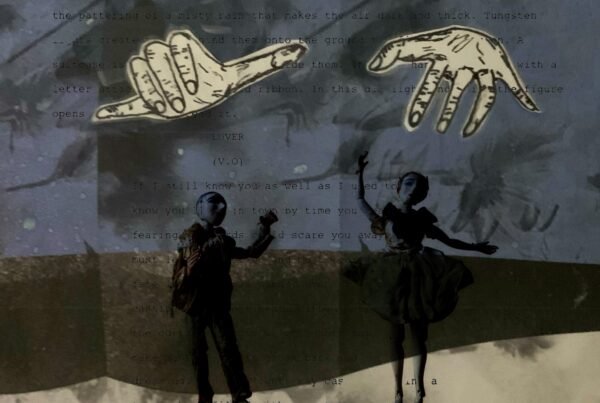Billie Eilish’s music is definitely sincere. It isn’t trying to be anything that it’s not. The struggles and sadness she’s singing about are universal amongst young adults. There is a Disney-esque aura hanging around this music, but if you can hear beyond that, there are some really enjoyable tracks here.
Release date: March 29, 2019 | Interscope Records | Website | Instagram | Facebook | Twitter
In the last three weeks, I found myself on at least two separate occasions, asking: ‘Guys, what the fuck is a Billie Eilish, and what does it do?’ This wasn’t a criticism, mind you – I genuinely had no idea. I feel like I still don’t, and I’m about eight listens deep into her debut full length LP WHEN WE FALL ASLEEP, WHERE DO WE GO?. What I can say with authority, though, is that Eilish is a 17 year-old singer/songwriter from the United States (obviously).
There are several accusations strewn throughout the internet badlands, as it is circled by buzzards, that Eilish is an industry plant. In lay terms, that’s someone who the fat cat, cigar smoking relics of a long-dead industry have decided will be the new face of popular music, often serving an ulterior, corporate motive, such as advertising. I’m not a big conspiracy guy, so whilst we know that these things definitely do happen, for the purpose of this review we’ll just pretend that Billie Eilish really did just release one song on her Soundcloud account, subsequently experience overnight stardom, and now dominates the entire world.
The album is quite evidently produced by Eilish’s brother; their close, friendly relationship is on display throughout the whole record, too. Right from the jump, we’re dropped into a 13-second intro of the two joking around about Eilish taking out her dental braces (an unintentional reminder that we’re listening to a 17 year-old girl singing). The first song “bad guy” begins, and I’m immediately aware of just how close these two must be; as Eilish references seducing her lover’s dad, I become overwhelmingly conscious of the fact that if I heard my own sister talking like this, I’d wretch.
Instrumentally, I think that there were better choices to open the record, but I’m sure it’s going to get a lot of young listeners pretty excited. This record definitely wasn’t made for 20-something, jaded journo types. “xanny”, however, is a very welcome change of pace. This is arguably my favourite track on the album. I think that the lyrical themes explored here are things that Eilish’s fan base could definitely benefit from hearing. Condemning the use of Xanax, after its insidious rise to popularity over the last few years, is something I commend her for. The song also boasts some of her best lyricism and vocal performances. These somewhat lazy-sounding, lounge neo-soul tracks are definitely where I most enjoy Eilish’s voice.
I really rate this type of production. It’s definitely not industry standard fare; Eilish’s brother clearly knows how to make records. Sometimes a kick and synthesised bass will drop together at the same time, and everything else will duck and distort in the mix. Dare I say, some of these songs actually sound hard. I’m surprised only because of the demographic this is meant to appeal to. Is the marketing department moving Eilish towards an older set of fans? I daren’t comment.
I had originally written a couple of paragraphs detailing the songs in the middle section of this record, but I backspaced them, because similar to these tracks, they just weren’t going to hold your attention long enough to get its point across. The album’s bellwether “bury a friend” was the first track I had ever heard by the 17 year-old pop sensation, and it probably has the most sinister edge to all of the songs on the record. But even when taking a darker route sonically, her music still sounds sickly sweet. Maybe that’s my own fault; maybe I’m unable to disregard her age and her fan base, and just take her music for what it is. This album is littered with references to pop and meme culture, which does nothing less than help solidify Eilish as the voice of her generation, for better or worse. Opting for the all-caps album title, in stark contrast to the all-lowercase song titles, this record appears to know its audience well.
On a more positive note, Eilish’s music is definitely sincere. It isn’t trying to be anything that it’s not. The struggles and sadness she’s singing about are universal amongst young adults. It does feel like there is a Disney-esque aura hanging around this music (in more ways than one), but if you can hear beyond that, I think there are some really enjoyable tracks here. My biggest gripe, really, is Eilish’s enunciation and delivery. Google ‘indie girl introduces us to her kitchen’ if you want to understand what kind of singing voices I absolutely cannot stand.
Ultimately, Billie Eilish is on the brink of becoming the most popular artist among young audiences. We can likely expect to see her feature on Post Malone’s next album, or perform at the Grammy Awards next year, and so on and so forth. As it stands, she is only 17 years old, and the industry isn’t trying to exploit her in the numerable ways that it does most other female artists. Although I imagine this will end the same way as it did for Miley Cyrus, we can all hope that Eilish stays as integral as she can, amongst the many temptations and manipulations she will undoubtedly be facing. WHEN WE FALL ASLEEP, WHERE DO WE GO? is worth a listen, even if it’s merely out of musicological curiosity.






